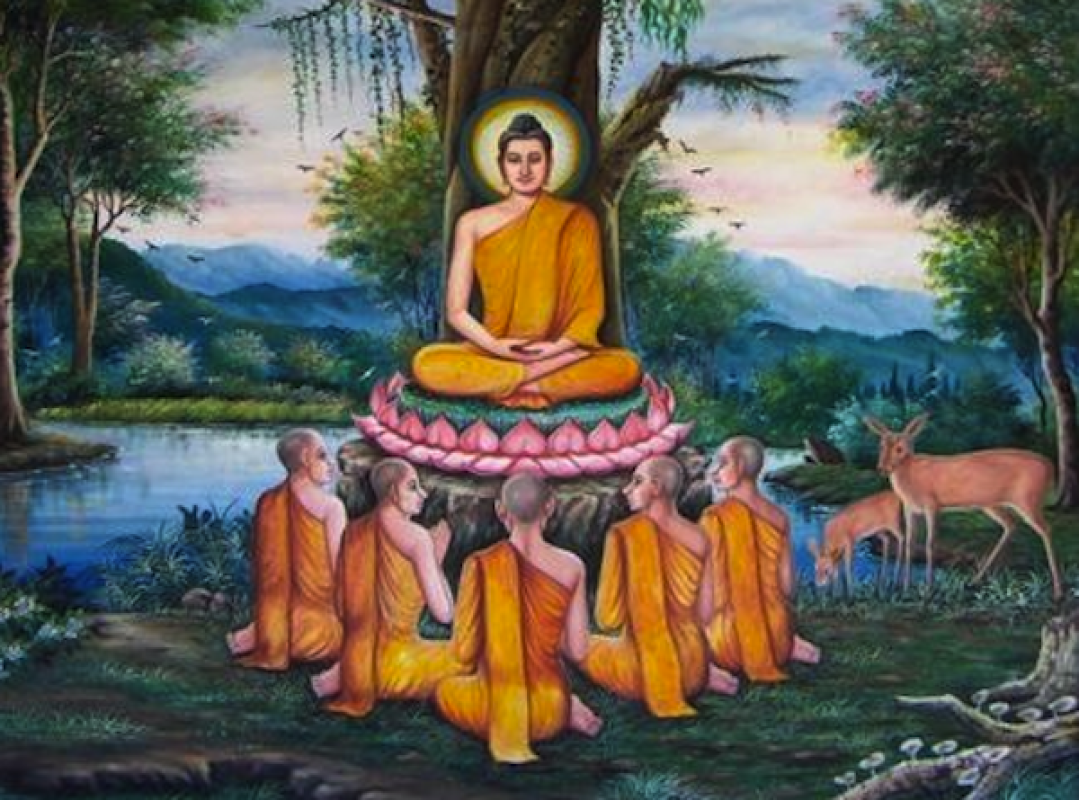Turning the Wheel of Dhamma: Myanmar’s Sacred Celebration of Dhammacakka Day

394

Hsu (NP News)
Myanmar, the Golden Land, is renowned for its shimmering pagodas and deep-rooted Buddhist traditions. Among the myriad of festivals that dot its calendar, Dhammacakka Day stands as a profound spiritual cornerstone, offering a unique glimpse into the heart of Theravada Buddhism and the vibrant cultural tapestry of the nation. For the international community, understanding this sacred day not only illuminates Myanmar's religious devotion but also invites a deeper appreciation for its rich heritage and the universal pursuit of peace and wisdom.
The Genesis of Dhamma:
The First Sermon
Dhammacakka Day commemorates one of the most pivotal moments in Buddhist history: the Buddha's delivery of his very first sermon, the "Dhammacakkappavattana Sutta" – The Discourse on the Turning of the Wheel of Dhamma. This momentous event occurred approximately 2,600 years ago, seven weeks after Siddhartha Gautama attained Supreme Enlightenment under the Bodhi tree. Having realized the profound truths of existence, the Buddha initially hesitated to teach, fearing that humanity, steeped in craving and ignorance, would not comprehend such deep wisdom. However, urged by Brahma Sahampati, he resolved to share his path to liberation.
He sought out his five former ascetic companions – Kondañña, Bhaddiya, Vappa, Mahānāma, and Assaji – who had previously abandoned him when he renounced extreme self-mortification. In the Deer Park at Sarnath, near Varanasi, India, the Buddha delivered this seminal discourse. It was during this sermon that Kondañña, understanding the teachings, became the first disciple to attain the first stage of enlightenment, thus marking the birth of the Sangha, the monastic community. This sermon laid the foundational principles of Buddhism, setting in motion the "Wheel of Dhamma" for the benefit of all beings.
Why This Day Resonates
Deeply with Buddhists
For Buddhists worldwide, and particularly in Myanmar, Dhammacakka Day is of paramount significance. It is not merely an anniversary but a living testament to the genesis of the Buddha's public teaching. This day marks the moment the Buddha began sharing the path to liberation, transforming his personal enlightenment into a universal doctrine accessible to all who seek it. It signifies the formal establishment of the Sasana, the Buddhist dispensation, providing a clear roadmap for spiritual development.
The "Dhammacakkappavattana Sutta" itself encapsulates the core tenets of Buddhism: the Middle Way, which avoids the extremes of sensual indulgence and self-mortification; the Four Noble Truths (Dukkha - suffering, Samudaya - the origin of suffering, Nirodha - the cessation of suffering, and Magga - the path to the cessation of suffering); and the Noble Eightfold Path, the practical guide to achieving liberation. Observing Dhammacakka Day is a powerful reminder for Buddhists to reflect upon these fundamental teachings, renew their commitment to the path, and strive for greater wisdom, compassion, and inner peace. It is a day to celebrate the profound gift of the Dhamma and the existence of the Sangha, which preserves and propagates these timeless truths.
Traditional Customs and
Rituals in Myanmar
In Myanmar, Dhammacakka Day is observed with profound reverence and vibrant traditions, often coinciding with the full moon day of Waso (July), which also marks the beginning of Vassa, the three-month Rains Retreat for monks. The day transforms the nation into a hub of spiritual activity, with families and individuals engaging in various merit-making deeds.
From dawn, pagodas and monasteries across the country become bustling centers of devotion. Lay devotees, often dressed in pristine white attire symbolizing purity, flock to these sacred sites. They bring offerings of fresh flowers, water, candles, and incense, meticulously placing them before Buddha images. Food offerings are prepared and respectfully offered to monks and nuns, who depend on the generosity of the laity. A central ritual is the collective chanting and listening to the "Dhammacakkappavattana Sutta" itself, often recited by senior monks. This solemn recitation allows devotees to reconnect with the Buddha's original words and reflect on their profound meaning.
Beyond the pagodas, many Buddhists dedicate the day to intensified spiritual practice. They may observe the Eight Precepts, a stricter code of conduct than the usual five, which includes refraining from eating after noon, using perfumes, and engaging in entertainment. Meditation sessions are prolonged, and Dhamma talks are attended, fostering a deeper understanding of the teachings. Merit-making extends to acts of charity, such as donating to monasteries, supporting the poor, or releasing captive birds and fish, symbolizing freedom and compassion. In some communities, there might be small processions carrying Buddha images or offerings, accompanied by traditional music and chanting, further amplifying the festive and devout atmosphere. These collective and individual acts of devotion underscore the deep faith that permeates daily life in Myanmar, making Dhammacakka Day a truly immersive spiritual experience.
An Invitation to Experience Myanmar's Spiritual Heart
Dhammacakka Day in Myanmar is more than just a religious holiday; it is a vibrant expression of a living faith that shapes the very fabric of society. The serene devotion, the communal spirit, and the timeless wisdom embedded in these traditions offer a compelling window into the soul of Myanmar. For the international community, witnessing or participating in these rituals provides an unparalleled opportunity to appreciate the profound peace and enduring cultural richness that Buddhism brings to this unique nation. It is an invitation to explore a land where spirituality and daily life are inextricably intertwined, fostering a deeper understanding and sparking an interest in Myanmar's captivating cultural and religious beliefs.